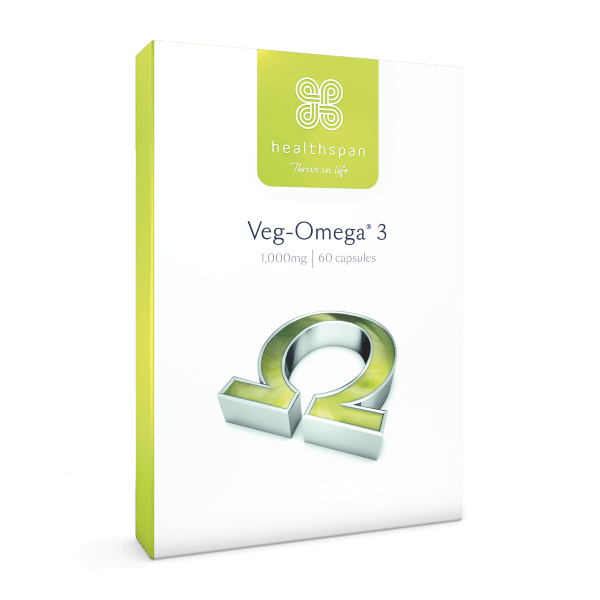Although oily fish is the best-known source of omega 3, fatty acids sourced from algae are an excellent alternative for vegans and vegetarians.
Healthspan offers a range of fish oil-derived omega-3 products, but new to the range is a vegan omega-3 supplement derived from algae. This new Veg-Omega 3 comes from supplier DSM: a science-based company specialising in nutrition, health and sustainable living.
Omega-3 fatty acids are a well-known nutrient found in oily fish and food supplements. They're a family of polyunsaturated fats associated with various health benefits, including supporting brain, eye and heart health.
Many adults fail to get enough omega 3s from their diet. The annual National Diet and Nutrition Survey (NDNS) found that in the years 2008 to 20171 oily fish consumption remained well below the recommended level of two portions of fish, one of which is oily, each week. Vegetarians, vegans and those who do not eat fish for other reasons are particularly at risk of deficiency.
What makes vegan omega 3 different?
It's a common misconception that fish are the original source of omega 3s. In fact, omega-3s come from algae – the foundational life form that feeds phytoplankton, which in turn is a primary food source for the fish that produce the omega-3 fatty acids.
Although those who do not like fish and choose not to eat it can take a fish oil supplement to improve their omega-3 intake, vegetarians and vegans do not have this option. Healthspan's Veg-Omega 3 range is derived from natural algae, which is the source of the beneficial fatty acids found in omega-3 fish oil.
The Veg-Omega 3 range is a naturally rich and concentrated formula, produced independently from the marine ecosystem to protect the oceans from overfishing, and because the algae is grown under closed and controlled conditions, there's no exposure to the environmental contaminants that have polluted the oceans.

Veg-Omega 3
High-strength fatty acids, no fish
- Sustainably sourced vegan omega 3
- High levels of essential fatty acids
- Supports brain, heart and eye health
Does vegan omega 3 have the same benefits?
Omega 3 is made up of EPA and DHA fatty acids, the health benefits of which include:
- Contributes to the normal brain development of foetuses and breastfed infants
- Contributes to the normal eye development of foetuses and breastfed infants
- Contributes to the maintenance of normal blood pressure
- Contributes to the maintenance of normal triglyceride levels
- Contributes to the normal function of the heart
Several studies have demonstrated that vegetarians and vegans have much lower concentrations of the omega-3 fatty acids EPA and DHA, compared to those who eat fish.
In a study published in Clinical Nutrition, vegans who had a low omega-3 index of four per cent or below were given DSM's 'life's™OMEGA' product, on which Healthspan's Veg-Omega 3 range is based, for four months.2 Participants in the study responded strongly to the algal omega-3 supplement, elevating their omega-3 blood levels to a healthier range.
In another study, 93 adults with high triglyceride levels were given 2.4 grams a day of life's™OMEGA, fish oil or a placebo.
Researchers found that the group taking life's™OMEGA showed a significant 19 per cent decrease in triglyceride levels (high triglyceride levels can cause health problems) as well as increases in healthy HDL cholesterol – all without the fishy burps that can be a consequence of taking fish oil supplements.3







